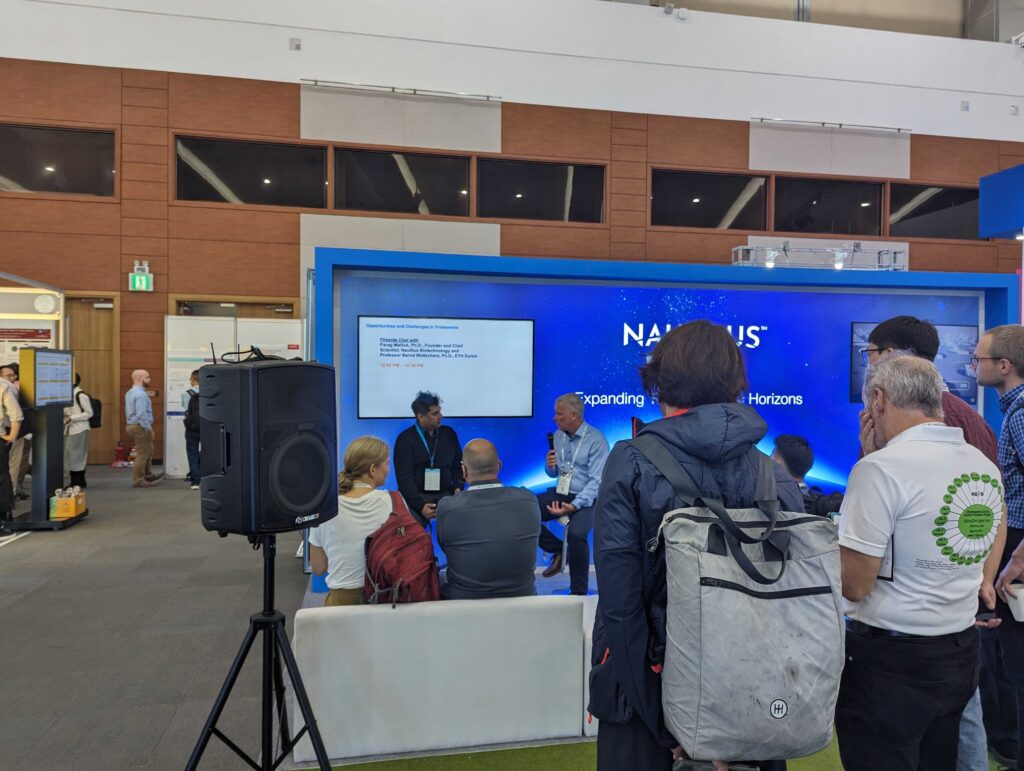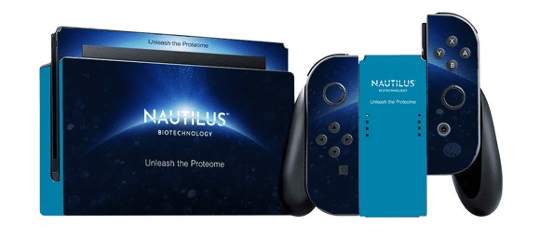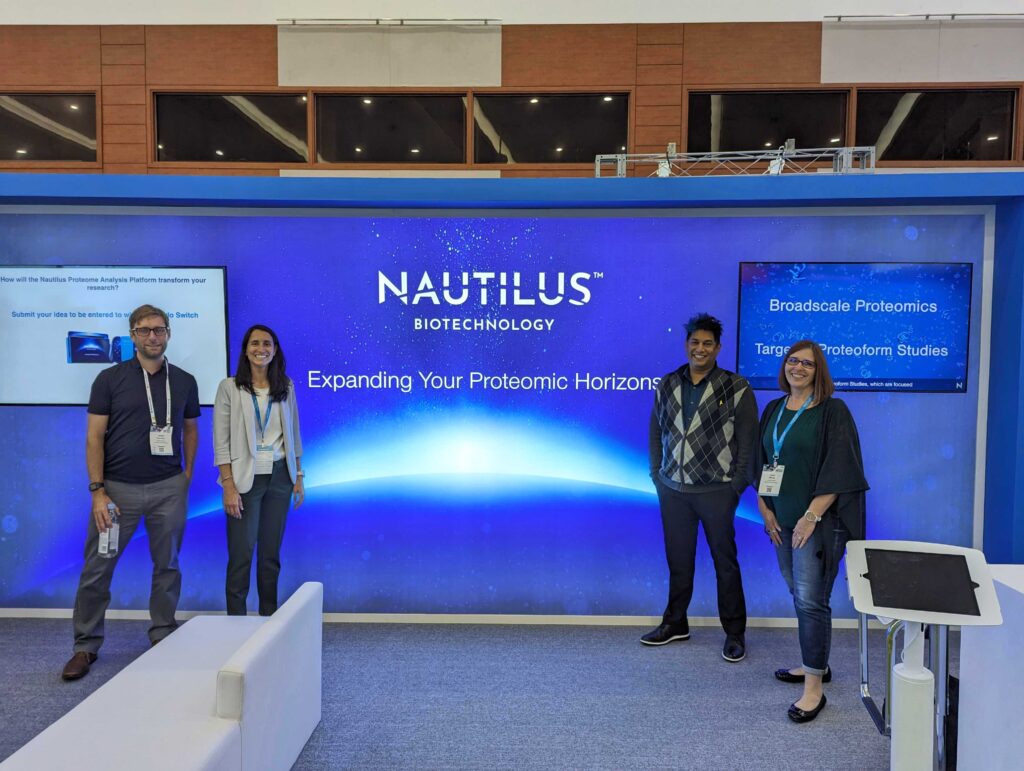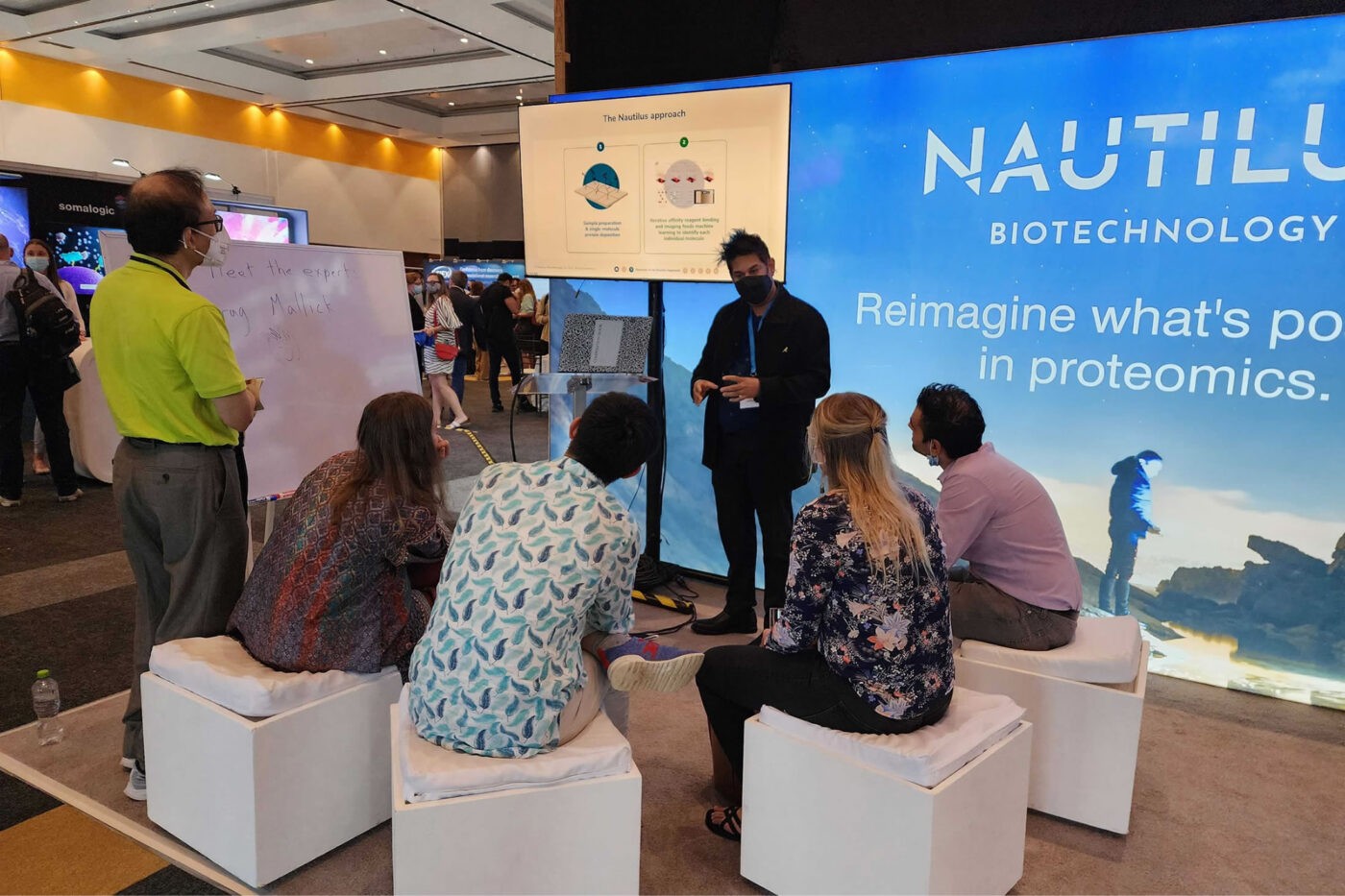Attending the HUPO 2023 World Congress gave us the opportunity to share recent advances in the development of the Nautilus Proteome Analysis Platform, discuss the benefits of our proteome-wide single-molecule analysis methodology, and learn how proteomics researchers hope to use next-generation technologies. In this blog post, we share some of the highlights from our own presentations as well as what we learned from attendees. We hope this post will give you a feel for the energy and creativity embodied in this exciting field!
Fireside chat with Professor Bernd Wollscheid, Ph.D., ETH Zurich – Proteomics needs an easy button

At our booth, we organized a fireside chat between Professor Bernd Wollscheid of ETH Zurich and Nautilus co-founder and chief scientist, Parag Mallick. Their discussion focused on the challenges currently facing proteomics. Some of the key takeaways included:
- Current proteomics workflows are not standardized or integrated.
- The field needs to agree on standard workflows to generate data. This will improve researchers’ ability to share and reproduce data across labs.
- Mass spectrometry is getting great at identifying many proteins, but proteins don’t really exist, only proteofroms do. We need to be able to identify proteoforms to understand their roles in biology.
- We need integrated workflows to make proteomics easier – we need a “red easy button” for proteomics.
Expanding proteomic horizons with single-molecule analysis at scale

During our talk titled “Expanding Proteomic Horizons with Single-Molecule Analysis at Scale,” Nautilus co-founder and chief scientist Parag Mallick shared some of the many benefits of the Nautilus Proteome Analysis Platform. The platform is designed to be capable of single-molecule analysis of billions of proteins at once. As a result, it aims to achieve higher dynamic range than traditional platforms while maintaining the highest possible level of sensitivity (single-molecule sensitivity).
Parag also stressed the incredible robustness built into our platform. It identifies proteins by monitoring binding of hundreds of multi-affinity probes over hundreds of cycles. These probes bind to 3-4 amino acid epitopes and patterns of probabilistic binding are decoded into protein identities through our PrISM methodology. The monitoring of hundreds of cycles of multi-affinity probe binding makes our platform resistant to error.
Unlike traditional methodologies which might identify individual proteins using single antibodies (western blotting) or the observation of a single peptide (mass spec), the Nautilus Platform builds identities from hundreds of observations for each and every protein. Thus, if there is some error in a fraction of the multi-affinity probe binding interactions, this should not have a dramatic effect on deciphering ultimate protein identity. We hope this will make the results coming off our platform more reproducible than those coming from traditional technologies and give researchers more confidence in the potential application and translation of their data.
After Parag covered the ins and outs of our platform, Professor Birgit Schilling, Ph.D. from the Buck Institute discussed how her postdocs Joanna Bons, Ph.D. and Jordan B Burton, Ph.D., winners of the Nautilus First Access Challenge, plan to use the Nautilus Platform to study kidney injury. Their preliminary work with traditional proteomics platforms has demonstrated dramatic changes to the proteome upon kidney injury. Now, Drs. Bons, Burton, and Schilling are excited to use the Nautilus Platform to get far more comprehensive views into parts of the proteome inaccessible to mass spectrometry. We can’t wait to see what they uncover!
HUPO attendees propose inspiring ways to use the Nautilus Proteome Analysis Platform

The proteomics field is full of creative researchers looking to leverage knowledge of the proteome for deep biological insights. To help catalyze the formation of exciting new research avenues, we ran a competition wherein HUPO attendees could win a Nintendo® SwitchTM by submitting answers to the question
“How will the Nautilus Proteome Analysis Platform transform your research?”
Some of the submission themes included enthusiasm at the possibility of using our platform to detect rare proteins, to characterize a broader range of proteins, and to avoid complex mass spectrometry workflows. In terms of applications, contestants were particularly excited to use the Nautilus Platform to characterize clinical samples and develop more biomarkers.
Many thanks to all who participated and congratulations to our winner, Annika Bendes from the KTH Royal Institute of Technology!
Observations from scientific talks – The ever-increasing scale of proteomics

To keep up to date on the latest thoughts and findings from the field, Nautilus team members fanned out and attended academic talks. Some of their key observations included:
- Proteomics researchers are continuously pushing the envelope in terms of the number of proteins they can identify. Recent studies identify thousands to tens of thousands of proteins. This is a great benefit to the field as it enables more accurate and robust biological insights from proteomics experiments. It also demonstrates one reason people are excited about the Nautilus Platform – we aim to give people the ability to routinely measure substantively the entire proteome without complicated workflows. We hope this will be huge boon to researchers stuck optimizing their workflows for every experiment.
- There is a growing appreciation for the importance of viewing the proteome at different biological levels. While many experiments still look at the proteomes of bulk samples, scientists know that single-cell and even subcellular proteomes can be very different. Indeed, the proteomic make-up of a particular cell or cell part largely defines its function (e.g. see our recent blog post on using proximity proteomics for the identification of axonal proteomes). We’re building our platform with the throughput necessary to measure many different proteomes in a reasonable timeframe and cannot wait to see researchers leveraging it for these kinds of insightful studies.
Ongoing development of the Nautilus Platform
The Nautilus team is hard at work building the Nautilus Proteome Analysis Platform to serve the proteomics community in ways that we expect will truly revolutionize their research and enable a step change in healthcare, biotechnology, and more. The enthusiasm and excitement we felt at HUPO leaves us more energized than ever to get our platform into the hands of researchers who will use it in inspiring and creative ways.
To stay up to date on all things Nautilus, be sure to subscribe to our blog and newsletter. We cannot wait to work with you!
MORE ARTICLES


